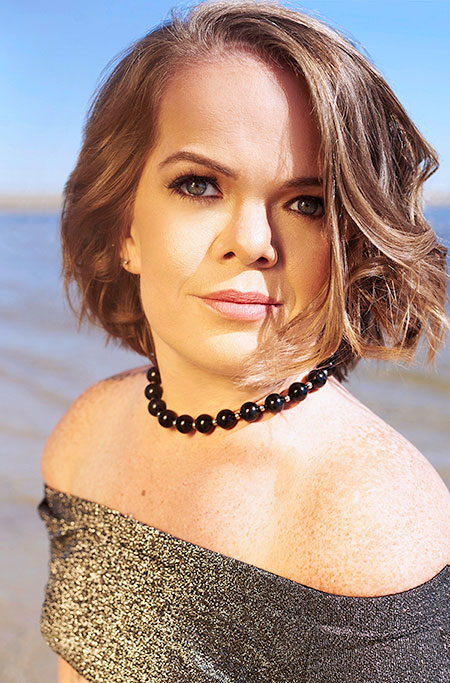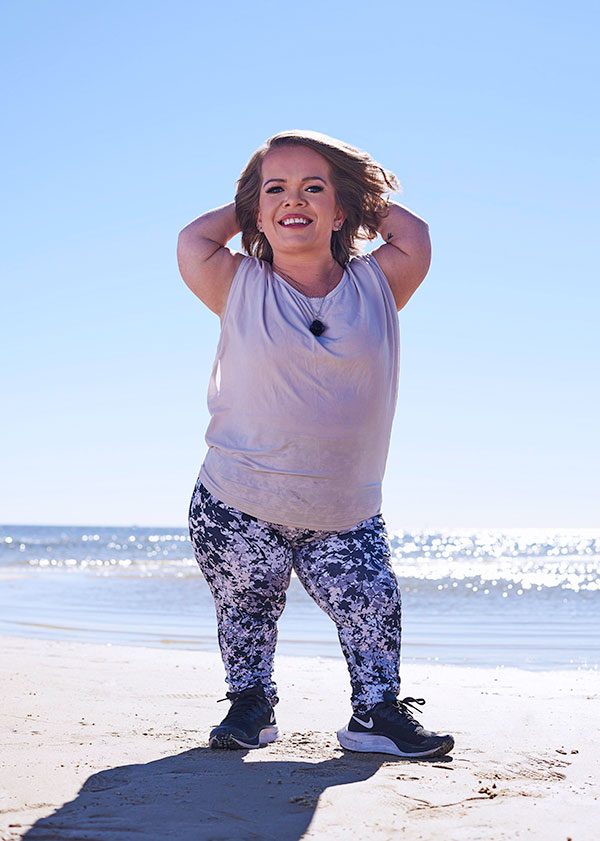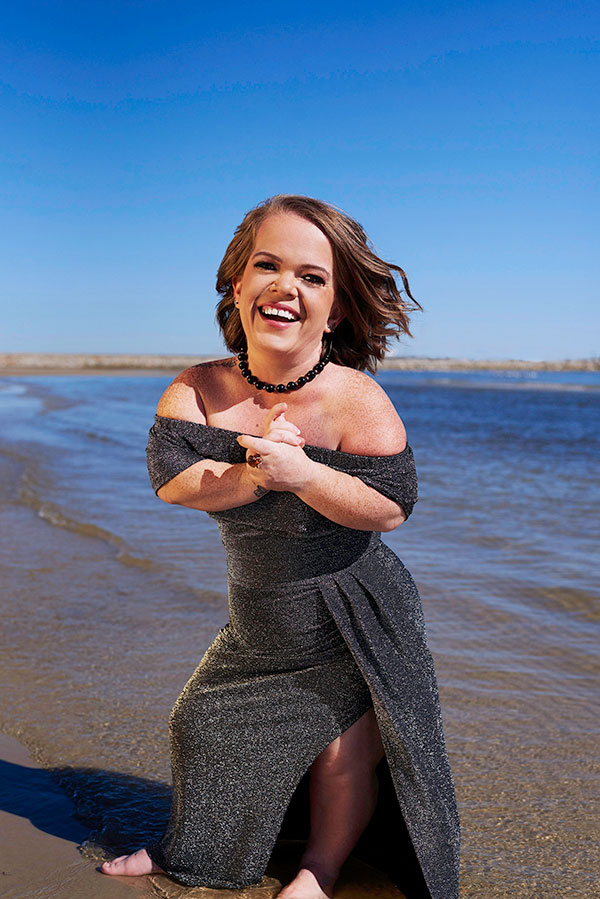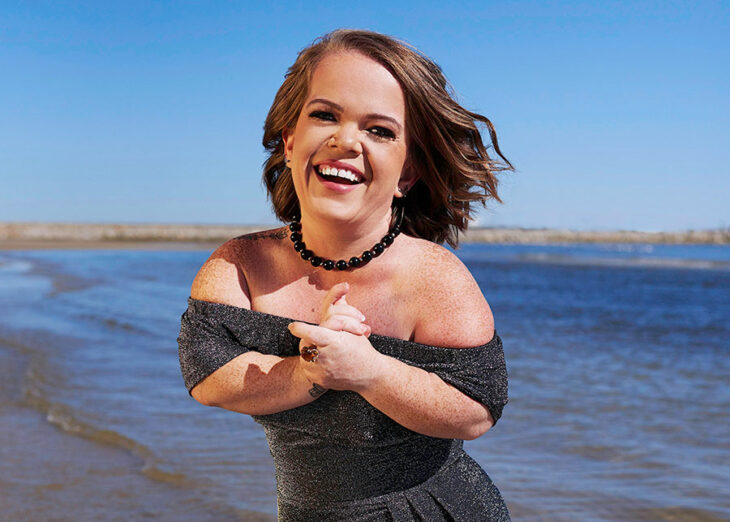
Photography by Brandi Stage
Whether she’s wearing workout gear or in full glam mode, Angela Singletary feels beautiful most of the time.
“I don’t always wear makeup, and my hair isn’t always done, but I appreciate my eyes, my freckles, my shape,” she says. “Of course, I would love to be a little more toned and think my face is more traditionally pretty with makeup, but in the end, I am grateful for who I am and how I am.”
Self-love hasn’t always come easy for the owner of Purpose by Ang, which offers nutrition and wellness coaching. She and her sister, both diagnosed with achondroplasia dwarfism, grew up in an abusive household. When Singletary was 14, her father committed suicide after two previous failed attempts.
Singletary’s grandfather provided some much-needed protection and stability. Still, she bore the responsibility of caring for her sister, whose condition caused severe disabilities, while also carrying her own load.
“My childhood formed lots of codependent and damaged qualities within me,” says the Biloxi native. “This caused me to pick a partner who I wanted to fix – twice.”
She married the second man, and they had three children together — daughters Aidan, 11, and Angela, 6, and son Dawan, 9. Although her spouse chipped away at her self-esteem over a decade, she persisted in trying to save the relationship — always thinking she could fix things as she had done her whole life.
“I finally decided enough was enough and walked away with nothing but myself and my three kids,” she says. “It was not easy, I felt like a failure, and I had to start all over as a single mom. It ended up being the best decision I ever made in my entire life.”

STARTING TO HEAL
Singletary overcame much of the trauma from her marriage and childhood through personal development, including therapy, reading, journaling, confiding in friends, meditating and staying committed to growth.
“It took a couple of years, and it was hard and messy work, but it was beyond worth it,” she says. “I am an entirely different person today than I was the day I walked away from that toxic marriage – both physically and mentally.”
Meanwhile, Singletary’s career also has evolved. After seven years of selling newspaper advertising, she went to Habitat for Humanity of the Mississippi Gulf Coast, where she gained invaluable connections and a wealth of knowledge about event planning, fundraising, relationship building and home construction; plus, she overcame her fear of public speaking.
In 2018, she graduated from Tulane University with a bachelor’s degree in health and wellness. Although the feat was difficult as a single mom, she wanted her children to see what was possible with hard work and support.
Of all her traits and accomplishments, Singletary is most proud of her resilience.
“I can pretty much always find good — even in the absolute worst situations,” she says. “This makes getting through the challenges and problem solving so much easier.”

HER OWN KIND OF BEAUTY
Singletary’s marriage left her with a confidence deficit in every aspect of her being – intellectual, spiritual, emotional and physical. Part of her recovery strategy was investing in herself with regular haircuts, quality skin care, flattering clothes and makeup. It also involved taking and posting selfies.
“That was one of the most therapeutic things I did for myself,” she says. “It felt very awkward and uncomfortable at first, but as I got used to putting myself out there, I became more comfortable with myself. Getting compliments and encouragement from women I admired was truly what helped me to see myself as beautiful.”
Standing 4 feet tall, Singletary realizes her height is the first thing people may notice about her. No matter how they react, she tries to respond with grace and kindness. Most people have times when they don’t feel good about themselves or their appearance, Singletary realizes, and while superficial things are easy to correct, deeper issues require a different mindset.
“Affirmations are a great place to start,” she says. “Take whatever negative statement you have, turn it into a positive one, and repeat it daily. … Write them down, hang them where you will see them every day (and) say them out loud daily. Eventually, you will rewire the neural pathways, and you’ll believe them.”
True beauty, as Singletary defines it, is kindness and confidence, which can’t be faked. Someone who has these qualities sees the best in others and wants them to see it in themselves.
“We are all different, so there is no mold or example of what physical beauty is,” she says. “However, when someone is a kind person, beauty truly glows from within them.”

THE BEST VERSION OF HERSELF
A main source of inspiration for Singletary is her children. She can empathize with her daughters’ struggles with dwarfism, which she says they handle with strength and maturity. Her son, who has attention deficit hyperactivity disorder and bipolar disorder, is learning to manage his impulsivity and anger outbursts.
“They motivate me to be the absolute best version of myself every single day,” she says.
As a health coach and nutritionist, Singletary helps clients reclaim control of their lives. The result isn’t about a number on a scale, being more attractive or weight loss, but about transformation and empowerment.
“Some of these women leave my program like a whole new person,” she says. “They believe in themselves. They find self-love, and they practice it. They understand why they have to fill their cup up first, and they do it unapologetically.”
During quarantine, many parents grew concerned about their children’s health and wellbeing. That prompted Singletary to start a kids’ coaching group that features weekly classes with emphasis on exercise and nutrition (facebook.com/groups/clubpurpose/).
“It is a purely positive experience with focus on things that are good for us,” she says. “There’s no talk of weight or negative things — just reinforcing healthy habits and why they are good for us.”
She’s also launched a women’s coaching group with weekly classes, exercises and a monthly workshop. Singletary says it’s a great place for women who need some guidance, support and accountability in reaching their goals (facebook.com/groups/ purposebycoachang).
Singletary’s weekly newsletter, filled with positive messages, nutrition info, a word of the week and more, is available at www. PurposeByAng.com.
Eventually, she wants to run an international health coaching business — helping people achieve whole health (mind, body and soul) through virtual coaching and personal training. She also aspires to create a nonprofit for women and children focused on nutrition education and to travel the world as a health-centric motivational speaker. Whatever she pursues next, rest assured Singletary will fight unapologetically for anyone and anything she believes in.
“I know growth is a constant work in progress, and I have likely not scratched the surface of the pain I need to mend and heal within myself,” she says. “I am glad I am in the place I am mentally so I can do just that.”
AWARENESS ADVOCATE
There are over 400 types of dwarfism, and Singletary has the most common — achondroplasia. October is Dwarfism Awareness Month, and in 2019, she posted daily on social media to raise awareness. She wanted to do more in 2020, so she continued the posts while also interviewing her LP (little people) friends — showcasing their talents and sharing insights into their lives. Singletary called the project, which is still available on her YouTube channel (Purpose by Ang), “A Little Perspective.”
Singetary is also president of the Mississippi Chapter of the Little People of America — the first chapter the state has had in decades. Members have been meeting via Zoom during the pandemic, but Singletary hopes to have in-person gatherings when conditions become safer.
Beyond people being unkind through ridicule, taking photos or making rude comments, Singetary wants to address the issues of accessibility and accommodation for those with dwarfism and various disabilities.
“Dwarfism awareness is important because it is such a rare condition that not many people have the chance to meet, much less know, a little person,” she says. “It’s important that we make our various conditions known and understood so as to eliminate the stigma that comes with being so different physically. In the end, we want to be treated like everyone else.”




2 Comments
Leave a Reply